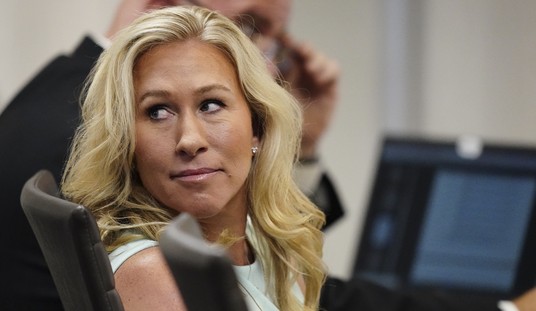We’re not talking actual budget cuts here, just a promise not to make the budget bigger. Or rather, part of the budget. A smallish part. For three years.
In his budget for Fiscal Year 2011, to be presented on Monday, February 1, President Obama will propose a three-year hard freeze on non-security discretionary spending, to last from 2011 through 2013.
This will save $250 billion over the next decade, senior administration officials told reporters. By 2015, non-security discretionary spending will be at its lowest level as a component of the nation’s Gross Domestic Product in 50 years…
This category – roughly one-seventh of the overall budget, or about 1/3rd of total discretionary spending — is generally what people think about when they say they want Washington, DC, to rein in spending, a senior administration official said. They don’t mean Medicare, Social Security, or defense spending, the official said.
In response to the announcement, Michael Steel, a spokesman for House Minority Leader John Boehner, R-Ohio, said, “given Washington Democrats’ unprecedented spending binge, this is like announcing you’re going on a diet after winning a pie-eating contest. Will the budget still double the debt over five years and triple it over ten? That’s the bottom line.”
It only applies to “non-security” discretionary spending, so the Pentagon is safe for the time being. But to put that $250 billion over 10 years in context, remember: We’re now running monthly deficits of upwards of $200 billion.
A flashback to the first presidential debate:
MCCAIN: How about a spending freeze on everything but defense, veteran affairs and entitlement programs.
LEHRER: Spending freeze?
MCCAIN: I think we ought to seriously consider with the exceptions the caring of veterans national defense and several other vital issues.
LEHRER: Would you go for that?
OBAMA: The problem with a spending freeze is you’re using a hatchet where you need a scalpel. There are some programs that are very important that are under funded. I went to increase early childhood education and the notion that we should freeze that when there may be, for example, this Medicare subsidy doesn’t make sense.
Let me tell you another place to look for some savings. We are currently spending $10 billion a month in Iraq when they have a $79 billion surplus. It seems to me that if we’re going to be strong at home as well as strong abroad, that we have to look at bringing that war to a close.
In fairness, what he’s proposing here isn’t quite an across-the-board hatchet. They only want a spending freeze in the aggregate, so they might increase spending for programs that need more while cutting spending from programs that don’t to arrive at net zero. It’s a bit more scalpel-y than one might think, in other words. But still: A hatchet would have been welcome.
Exit question one: Granted, this is a cynical political move that he almost certainly wouldn’t have made if not for his collapsing support among independents, but even a cosmetic gesture deserves a golf clap, no? Exit question two: So, just as most of the costs of ObamaCare’s first decade wouldn’t start to be incurred until his second term, this freeze would be in effect smack dab during his reelection campaign in 2012, huh? Fancy that.
Update: Alex Conant says it’s kabuki.
This isn’t news. In the budget proposal that President Obama submitted to Congress last year, his budget office already projected actual cuts and freezes in “non-defense” discretionary spending for the next three years. That’s in part because of the huge increase in that area of spending that the President requested (and received) for the current fiscal year. To be specific: FY2009 (President Bush’s last budget) had $589 billion in non-defense discretionary spending. That number jumped to $687 billion in FY2010 (Obama’s first budget), and then drops to $641 billion in FY2011, $622 billion in FY2012 and $625 billion in FY2013. So for the White House to now boast that it will freeze non-defense discretionary spending is hardly news. If anything, it’s backtracking on its earlier plans to actually cut that area of spending.
Update: Nick Rizzuto e-mails to remind me that Democrats were kicking this idea around last week and, as of the morning of the Massachusetts election, had more or less ruled it out. New life, thanks to Scott Brown?
Orszag last year instructed every executive department to prepare three budget requests: one that matches the 2011 spending levels set by the president in his initial budget proposal from early last year; another that would freeze discretionary spending; and a third that reduces spending by 5 percent.
But the Democrats warn that cutting or freezing spending at this point might further damage the economy. The White House should focus instead on spending government dollars to help the economy recover and bring the unemployment rate down from 10 percent, they said.
“We cannot invite a W-shaped recession, or an M-shaped recession,” said Rep. John Olver (D-Mass.), the chairman of the House Appropriations subcommittee for the departments of Transportation and Housing and Urban Development, when asked by The Hill about a spending freeze.







Join the conversation as a VIP Member